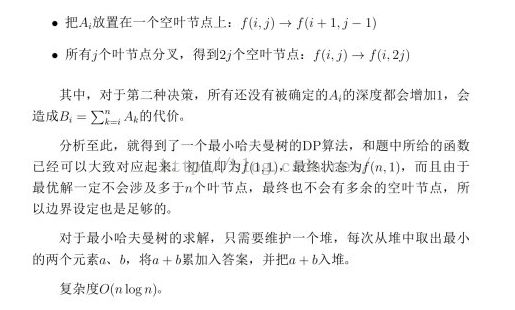2015 多校联赛 ——HDU5350(huffman)
Problem Description
MZL is a mysterious mathematician, and he proposed a mysterious function at his young age.
Stilwell is very confused about this function, and he need your help.
First of all, given n positive integers Ai and Ai≥Ai+1 .
Then, generate n positive integers Bi
Define f(i,j) for i,j∈Z
Find f(n,1) .
Stilwell is very confused about this function, and he need your help.
First of all, given n positive integers Ai and Ai≥Ai+1 .
Then, generate n positive integers Bi
Bi=∑j=inAj
Define f(i,j) for i,j∈Z
f(i,j)=⎧⎩⎨⎪⎪⎪⎪⎪⎪0min(f(i−1,j+1),f(i,⌈j2⌉)+Bi)1011037(i,j)=(1,1)i,j∈[1,n], (i,j)≠(1,1)otherwise
Find f(n,1) .
Input
The first line of the input contains a single number
T , the number of test cases.
For each test case, the first line contains a positive integer n , and the next line contains n positive integers Ai .
T≤100 , 1≤n≤105 , ∑n≤106 , 1≤Ai≤104 .
For each test case, the first line contains a positive integer n , and the next line contains n positive integers Ai .
T≤100 , 1≤n≤105 , ∑n≤106 , 1≤Ai≤104 .
Output
For each test case, output
f(n,1) in a line.
Sample Input
3 3 1 1 1 5 28 26 25 24 1 10 996 901 413 331 259 241 226 209 139 49
Sample Output
5 233 11037
//完全没看出来是个huffman - -!
#include <iostream>
#include <cstdio>
#include<algorithm>
#include<cstring>
#include<functional>
#include<queue>
typedef long long ll;
using namespace std;
int main()
{
int T;
int n,a;
priority_queue<ll, vector<ll>, greater<ll> >q;
scanf("%d",&T);
while(T--)
{
scanf("%d",&n);
while(!q.empty())
{
q.pop();
}
for(int i=1; i<=n; i++)
{
scanf("%d",&a);
q.push(a);
}
ll sum = 0;
while(!q.empty())
{
ll x = q.top();
q.pop();
if(q.empty())
{
continue;
}
ll y = q.top();
q.pop();
ll tmp= x + y;
sum+=tmp;
q.push(tmp);
}
printf("%I64d\n",sum);
}
return 0;
}
